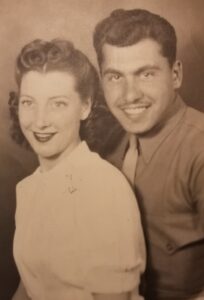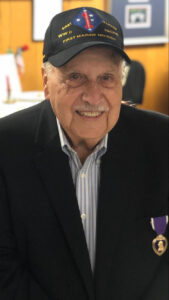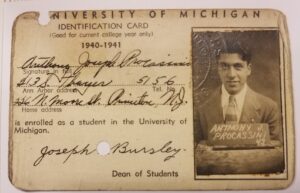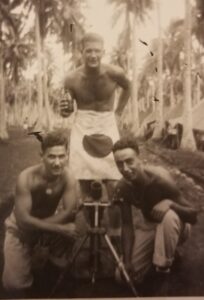The heart of the matter

Anthony Procassini and his late wife, Dawn, were married from 1944 until her passing in 2018. (Image courtesy of Anthony Procassini.)
Awards and medals didn’t mean much to U.S. Marine Anthony Procassini, ’47, who was wounded during the Battle of Okinawa while serving in World War II.
After the war, Procassini was entitled to receive the Purple Heart, the military decoration awarded in the name of the President to those wounded or killed while serving.
But the Ann Arbor-based veteran, now 98 years old, never received it.
However, that didn’t bother him.
Procassini felt making it home alive to his wife and family was all that mattered. Besides, he had other things to worry about now that he was a civilian again, not the least of which was finishing his education at U-M.
Procassini entered the business world, working 28 years for the Bendix Corp. before starting his own human resources management firm, A.J. Procassini and Associates, in 1980. He retired in 2014 at age 93.
An active member of the community, he served on the Ann Arbor Chamber of Commerce Education Committee. In addition, he was a founder of Washtenaw Community College (WCC). He served on the WCC Board of Trustees for 28 years. With Dawn, his late wife (they were married from 1943 until her death in 2018), they raised 10 children.
“[The Purple Heart] is one of those things I never thought about very much,” Procassini says with a shrug.
A long time coming

In July 2019, at age 98, WWII veteran Anthony Procassini finally received his Purple Heart. (Image courtesy of Anthony Procassini.)
The subject of the Purple Heart wasn’t brought up for years until granddaughter Katie Johnson, BS ’11/BSN ’15, conducted an oral history with Procassini in 2018. He told her about the injuries he sustained during World War II. When she learned he didn’t get the Purple Heart, Johnson and two of her aunts, Linda Binder and Laurie Procassini, campaigned for him to receive it.
“We started going through the paperwork, which was about an inch thick,” Procassini says. “We were told everything had cleared but we didn’t see it. I was at an M-Club meeting. A fella (Chuck Bernard of the Marine Corps League) came into the room looking for a seat. I was in the back and there was a seat next to me … I found out he was a Marine. One thing led to another. He got me active with his veterans group.”
Thanks to Bernard, Procassini and six fellow Marine vets met with Robert Neller, the recently retired 37th Commandant of the Marine Corps, on April 6, 2019. Afterward, Procassini was notified he would be awarded the Purple Heart July 12, 2019, at a ceremony at the Ford Dearborn American Legion Post.
“I was glad to get it just for the sake of my grandkids,” says Procassini, who has 18 grandchildren and two great-grandchildren. (Besides Johnson, grandson Anthony Binder graduated from U-M in 2014).
Lt. Col. John C. Gianopoulos of the 24th Marine Regiment, 1st Battalion, at Selfridge Air National Guard Base, awarded Procassini with the Purple Heart. The crowd burst into thunderous applause with some shouting “Oorah,” the Marine battle-cry.
More than 100 people attended the ceremony, including many of Procassini’s relatives, some coming in from the West Coast. Rep. Debbie Dingell and Sen. Gary Peters also came to celebrate.
“I thought it would be a small event; it turned out to be a large affair,” Procassini says. “That surprised me a lot.”
U-M in the 1940s

Anthony Procassini’s U-M ID card from the 1940-41 academic year. (Image courtesy of Anthony Procassini.)
Procassini was born in 1921 in Lambertville, NJ, the youngest son of Italian immigrants. He was the first of his parents’ five children to be born in the U.S. After graduating from high school, Procassini and his friend, Ferdinand Rondon, enrolled at U-M. It was fall 1939.
“He told me he was going to Michigan. I asked him, ‘What made you want to go there?’ He said, ‘It’s very, very reasonable. The tuition’s cheap,’” recalls Procassini, laughing.
For his first semester, Procassini’s tuition totaled approximately $70.
“Keep in mind, I was an out-of-state student. Now you know why I went to Michigan.” Procassini winks. “It’s a great school, too.”
During his time at U-M, Procassini dressed in a shirt and tie for class. When asked if he lived in a dorm or a fraternity, he answers: “Hell no! That was for the rich kids. I lived in a house on the corner of Church and Willard my first year. It was a three-story residence. Ferdinand and I were lucky to share the attic with two other people.”
It was at Alexander Drugs on 727 N. University where Procassini met his future wife, Dawn, a lifelong Ann Arbor resident. She worked the soda fountain, while he scrubbed the floors. They were married April 5, 1944.
World War II

Anthony Procassini (kneeling, left) with two fellow Marines during World War II. (Image courtesy of Anthony Procassini.)
In November 1943, Procassini enlisted in the Marines. When he finished basic training a month later, he became a mortar crewman assigned to the 1st Marine Division.
“I thought I’d join the Coast Guard because it was close to home, but it didn’t work that way,” he quips.
His unit’s first assignment overseas was “Item” Company, 3rd Battalion, 1st Marine Regiment, under the overall command of the legendary Col. Lewis “Chesty” Puller at Peleliu. The 1st Marine Division suffered a 56 percent casualty rate (wounded or killed), more than any other unit at Peleliu. Miraculously, Procassini was unscathed, attributing that to “the Guy Upstairs.” The first unit to be relieved, it decamped to Pavuvu, in the Solomon Islands, to re-outfit and prepare for the next battle: Okinawa.
“The first time we got to Pavuvu – this was before Peleliu – we said, ‘What a hellhole.’ We went to Peleliu and when we came back to Pavuvu, we said, ‘That’s a beautiful place.’ So it’s all relative,” he recalls.
On April 1, 1945 – Easter Sunday – Procassini’s unit fought in the Battle of Okinawa, one of the bloodiest battles of World War II. The 1st Marine Division was the part of the U.S. 10th Army Division, which was composed of the 1st, 2nd, and 6th Marine Divisions, as well as the 7th, 27th, 77th, and 96th Infantry Divisions. The initial job of the 1st Marine Division was securing the central region of the island while the 6th Marine Division secured the north and the Army secured the south.
“We marched across the island for 15 days with little or no contact,” explains Procassini. “Unlike Peleliu, we didn’t encounter much of the enemy, but the Army encountered a great deal more fighting. The 1st Division diverted to the south and replaced the Army. We continued there until the island secured in June 1945.”
Wounded in action
Procassini was wounded May 14, 1945, when the Japanese pinned down him and his fellow Marines.
“We were on a ridge – I don’t remember the exact ridge – and the enemy opened up with a bombardment of artillery fire,” says Procassini. “A shell landed close by and exploded, resulting in a blast concussion. I had no idea how long I was out.”
After two weeks in a field hospital, Procassini returned to the front lines on June 1, 1945. By the time he fully recovered, the Battle of Okinawa was over.
“We went into training, preparing to invade to Japan,” he says. “As you know, the atomic bomb was dropped on Hiroshima Aug. 6 (1945). Most people were surprised that the bomb resulted in such devastation. When the second bomb was dropped (on Nagasaki, Aug. 9), the armistice came. If not for the bomb, they (the Japanese) wouldn’t have given up so damn quick in my opinion.”
After the war

Anthony Procassini with his late wife, Dawn, when he graduated from U-M in 1947. (Image courtesy of Anthony Procassini.)
Following the Japanese surrender, Procassini was promoted to corporal and stationed in China for several months.
“The Marines changed me from a civilian to a combatant,” he says. “One thing you learned about the Marine Corps is they gave everybody excellent training and you were prepared for combat. There were two kinds of Marines in those days: The ones that’d been over there fighting and the ones that were gonna go over there to fight.”
Procassini returned stateside Jan. 1, 1946, and was honorably discharged Feb. 16, 1946. He had 9-10 credit hours left to complete his bachelor’s in psychology at U-M, which was paid for by the G.I. Bill. Before graduating in 1947, Dawn gave birth to their first child.
“The best move I ever made was coming to U-M,” Procassini says. “I enjoyed going to school here. I had a great experience working there. I met my wife here. It was a great blessing.”
Go Blue!
For 63 years, Procassini volunteered on the sidelines at U-M home football games. At a U-M basketball game in 2017, the proud Wolverine was named “Veteran of the Game.” Once announced, he walked out to center court at half-time.
“Do you want to know what got the biggest cheer?” he says. “It wasn’t my service record. It’s when they said I had 10 kids. You think I’m kidding, but I’m not.”
(Top image: 1947 alumnus Anthony Procassini was awarded the Purple Heart on July 12, 2019.)




Jeff Klinger - 1972
Important, interesting story representing a fading generation of those who served in WWII. The final note in the piece refers to the top image. Mr. Procassini is correctly identified on the right of the photo. The person greeting him is a Marine Sergent Major, not LTC Gianopoulos.
Reply
Deborah Holdship
Thank you. That note has been corrected.
Reply
David Sable - '70 BS, '74 MD
I cannot express how much thanks and honor is due to you and your mates on the Pacific front. I am 71, my father served in the army as a MSGT in 1943-44 in the Philippines. I served in the Navy as an MD-medical officer at the tail end of the Vietnam War. I visited Peleliu and could only imagine the fear and horror that all who served at that time experienced. Do not be hesitant – wear all of your medals with pride. Thank you and God bless you for your service in such a terrible time in our history.
Reply
Pam Jacobson - 1989-LSA Honors
Shared this wonderful story with my 84 year old Dad, who served in the Army. His response: “What a heartwarming story. A real AMERICAN.”
My maternal grandfather earned a Purple Heart in WWII so Mr. Procassini’s story really spoke to me. I couldn’t agree with him more that “The best move I ever made was coming to U-M.” Congratulations to him and all the best to him and his family.
Reply
Kathleen Brevick - 1972
Thank You, Marine
Reply
Hilda Seifert
Anthony J. Procassini, passed away this day of September 10, 2021.
Reply
Deborah Holdship
Dear Hilda: Thank you for your note. I am so sorry for your loss. I am grateful that I got to know a little about Anthony from the story Kurt Krug wrote for Michigan Today. He sounds like a wonderful person. A real Michigan Man. — Deborah
Reply